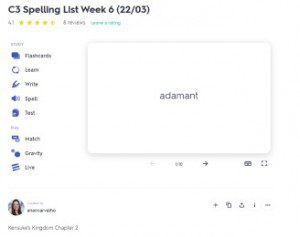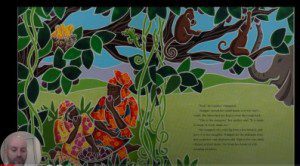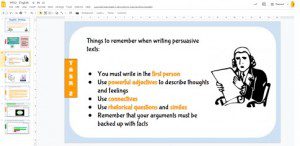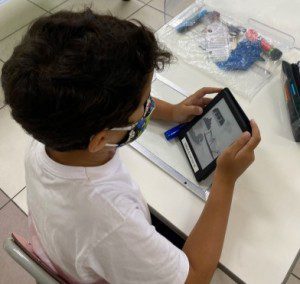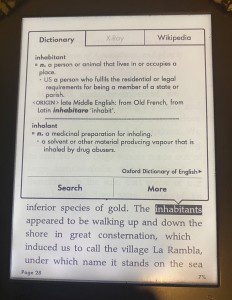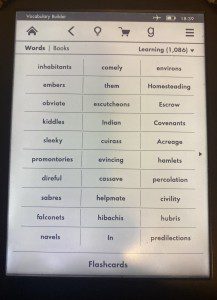Following the National Curriculum in England, our English programme of study has four key elements:
- Writing
- Reading
- Spoken language
- Spelling, vocabulary, grammar and punctuation (SPaG)
When we transitioned over to e-learning, during lockdown, we wanted to make sure to provide as many opportunities as possible to facilitate teaching and learning for each one of these areas.
We therefore fully embraced the best e-learning platforms we could find, to replicate children’s experiences in the classroom while they were working from home. In fact, in some areas, we went beyond simply replicating children’s classroom experiences, and we were able to enhance children’s learning experience through the use of digital technologies.
Let’s take a look at some examples of how we have been doing this:
1. Quizlet to help children with their spellings. Quizlet is a web application that enables users to easily make digital flashcards and has been particularly effective for memorising spellings as well as consolidating understanding of word definitions.
2. Screencasting software such as Loom to deliver read-aloud sessions for children. Screencasting is where you narrate a video recording of your computer screen – a very handy skill to learn when teaching online! The advantage of an app like Loom is that it also records a video of the teacher talking, and this appears on the side of the screencast, making the teacher’s explanation much more intuitive to follow.
3. EdPuzzle has proven brilliant for supporting children’s reading and developing their comprehension skills. Our teachers have been making interactive read-aloud videos for students, which are embedded with comprehension quizzes.
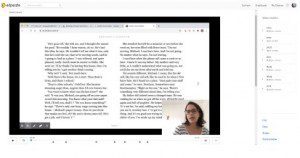
5. Google Docs & Slides has provided many writing opportunities for our students. The school’s Google suite of tools, in particular, has proven particularly useful for teachers to provide feedback on written assignments via the use of private comments.
6. Google Classroom has remained our core platform for handing out and collecting in assignments. It also allows us to easily track students’ work submissions.
Digital Resources for use at Home:
Kindles
While we use Kindles in the school, they can be brilliant devices to encourage and help students with their reading at home. Firstly, unlike smartphones or tablet devices, they do not have a luminous screen, which means they cause less eye strain. In fact, they employ a special type of display, commonly referred to as an “e-paper” display. As devices specifically designed and built for reading, they also come without the many distractions associated with other digital technologies.
Secondly, the new Kindles help young readers tackle challenging vocabulary. The built-in dictionary software, which turns itself on when the student long presses a word, quickly looks up the definition of the word. This is generally something that teachers are doing automatically; when teachers are reading with or to students, attention is paid to new vocabulary – both a word’s meaning and its correct punctuation. When students are reading alone therefore, the Kindle’s in-built dictionary and vocabulary builder can be a really useful set of tools.
Thirdly, every word looked up is automatically added to a ‘Vocabulary Builder’, which creates flashcards that students can use to learn the definitions and usage of words.
Finally, it is much easier to find a range of appropriate books from the Kindle store than hunting around bookshops!
Classroom Flipped provides learners with easy access to the best resources on the Web, to help support their learning. I originally designed this website to link all relevant, child-friendly resources to our International Primary Curriculum.
Bug Club is a platform that contains hundreds of fiction and non-fiction books. Each book is carefully levelled so that children can access books, which are appropriate for their reading level, before moving onto more challenging books as their reading skills improve. It also comes with ‘Progress & Assess’ quizzes, which tests children on what they have read, while helping them to improve their reading fluency and comprehension skills.
Concluding thoughts…
Our e-learning environment has facilitated an environment in which students are becoming more active creators instead of solely passive content recipients. After all, students learn best in an environment that they “own”, which adjusts rapidly to meet their learning needs and interests. As a team, we are continually learning how to effectively embed these learning technologies into our teaching practice. Indeed, as we gradually return to normality, we are looking forward to taking what we have learnt during these peculiar times, to further enhance our teaching practice and develop students’ learning.

